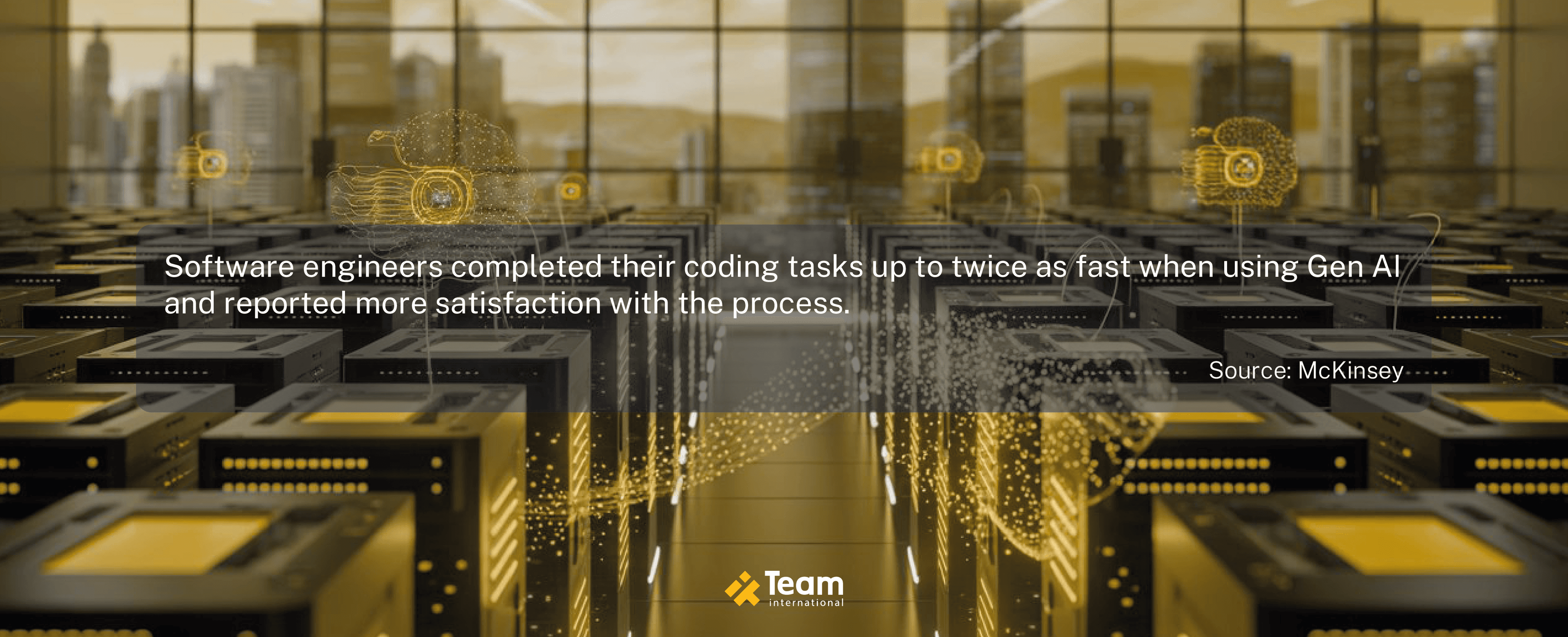Artificial Intelligence is no longer a sci-fi promise but a tangible reality reshaping the business landscape. In fact, recent McKinsey research indicates that generative AI alone could automate up to 70 percent of business activities across almost all occupations by 2030.
However, embarking on an AI journey without adequate preparation is like trying to climb a mountain without the proper gear: risky and with a low probability of success. Our article is your essential guide to understanding enterprise AI readiness. We'll explore the fundamental pillars you must build to adopt AI and truly thrive with it.
Unlocking the potential of AI readiness in enterprises
Today, implementing AI-powered tools is no longer optional; it's becoming imperative for enterprises seeking to remain competitive, efficient, and relevant in a fast-evolving global market. In a recent survey, business adoption of AI jumped to 72 percent in 2024 (McKinsey), a significant leap from approximately 50 percent in the previous years. This statistic underscores a clear message: artificial intelligence is here to stay, it advances, and AI integration in business accelerates.
In the middle of this rapid evolution, a critical concept emerges: AI readiness. At its core, it refers to an organization's comprehensive preparedness to adopt, integrate, and scale AI solutions effectively. This term includes key elements such as technological infrastructure, data quality, talent capabilities, and organizational culture.
AI readiness is about establishing the foundational elements that ensure not just the deployment of artificial intelligence but its successful and sustainable impact across the entire enterprise. Without a robust strategy for AI readiness, companies risk missing out on this technology's vast benefits and encountering significant hurdles that can derail their transformation efforts.
Why AI readiness is crucial for your business
In the era of data and intelligent automation, AI readiness isn't just a buzzword but a strategic imperative underpinning long-term success. Ignoring this critical preparatory phase can lead to costly missteps and wasted opportunities. Conducting an AI readiness assessment is a vital first step to understanding where your organization stands and what gaps you need to address before moving forward with implementation. Here are three reasons why ensuring your business is AI-ready is absolutely crucial:
Staying ahead: AI has transitioned from a mere competitive edge to a strategic necessity. Businesses that embrace AI readiness are better positioned to innovate, optimize processes, and gain a significant advantage over competitors who lag in adoption. It’s about securing your place in the future market.
Avoiding risks and costly failures: Many AI projects fail, not because of technology but because of inadequate preparation. AI readiness addresses common pitfalls such as poor data quality, lack of skilled talent, or misaligned organizational goals, significantly increasing the probability of successful implementation and return on investment.
Driving comprehensive business transformation: AI readiness is the gateway to profound enterprise-wide transformation. It empowers businesses to optimize operations, unlock new opportunities, and reshape the market!

Essential elements of AI readiness
True AI readiness isn't about quickly implementing the latest tech. Instead, it's about building a strong, reliable foundation. This includes several key components designed to ensure your business is genuinely prepared to harness the full power of artificial intelligence. According to Infosys’s research, there are five core elements critical for achieving enterprise AI readiness:
Strategy: First, think clearly about what you want to achieve with AI in your company. Define your goals and make sure AI helps you reach them. A strong strategy answers your journey's "why" and "what," providing a clear roadmap.
Governance: Enforce clear rules for using AI safely and fairly. This includes protecting data, avoiding ethical issues, and ensuring compliance with local and global laws. Effective governance ensures that your AI systems are fair, transparent, and compliant with regulations.
Talent: The team of experts is vital. It's all about attracting, developing, and retaining professionals with AI skills and upskilling existing employees to work with artificial intelligence.
Data: Generative AI models are only as good as the data they're fed! This element highlights the necessity of robust and high-quality content across all types—structured and unstructured. Organize your data, making sure it's accurate and easy to find and use. Remember, preparing it often takes much time and effort.
Technology: Have the right tools in place. This means having the right tech infrastructure (like servers and software) to handle massive arrays of information and the opportunity to expand depending on your business needs.
Effective strategies for seamless AI integration
Building a strong foundation for AI is crucial, but the real benefit comes from smoothly integrating AI into your daily operations. It means making artificial intelligence a natural part of your business, boosting efficiency and value. Developing and applying AI adoption strategies is essential to ensure the transition is effective and sustainable. Here are key strategies to achieve seamless AI integration:
Start small, scale smart: Don't try to do everything simultaneously. Begin with small, narrow-focused projects that solve specific problems. Learn from these early successes, then gradually expand to other areas.
Boost efficiency and automate tasks: Apply artificial intelligence to smooth operations. AI-powered tools can analyze data to automate repetitive tasks and optimize workflows across different departments.
Keep learning and adapting: AI is constantly changing. Regularly check how your AI systems perform, collect feedback, and adjust your strategies and models on the go. This ongoing process ensures your AI solutions stay adequate and relevant as your business evolves.
Final thoughts
Being ready to use AI is vital, but the magic happens only after you seamlessly integrate it into your business. This way, you'll unlock opportunities to boost operations, make smarter decision-making choices, and constantly adapt to changing market conditions. The power of AI is undeniable, and its impact is clear across industries. For leaders, thriving is having the vision to lead an AI transformation that redefines their sectors' operations. Don't just prepare for the future of AI—lead it with a trusted IT partner that has all the necessary AI/ML engineering experience in-house.
